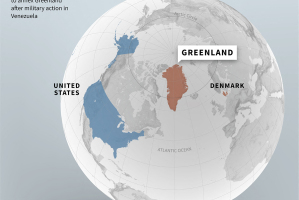Capitalism: Is Creating Wealth Godly Work?

Capitalism is an organized system to guarantee that greed becomes the primary force of our economic system and allows the few at the top to get very wealthy and has the rest of us riding around thinking we can be that way, too—if we just work hard enough, sell enough Tupperware and Amway products, we can get a pink Cadillac.
So says film-maker and author Michael Moore of Roger & Me and Fahrenheit 9/11 fame. Ironically, Moore has become a multimillionaire condemning the system that has made his wealth possible.
Certainly, in today's culture, there is a certain disdain for wealth. And while there are many examples of the misuse of power to create wealth and how wealth itself has caused much corruption and evil, the Bible has plenty to say about the positive aspects of wealth creation.
The Bible claims that the creation of wealth is both a godly gift and a command. It also tells us that wealth should be shared, but it cannot be shared if it is not created. Unfortunately, the biblical role of wealth creation is misunderstood in many churches today.
The Source of Both Wealth and the Ability to Create Wealth
But remember the Lord your God, for it is he who gives you the ability to produce wealth, and so confirms his covenant, which he swore to your ancestors, as it is today (Deut. 8:18).
In Deuteronomy 8:18, Moses tell us four important things about wealth creation:
First, he reminds us that it is the Lord God who gives us the ability to produce wealth. The very idea of wealth creation is ultimately rooted in God the creator and is underscored in Leviticus 25:23, and 1 Chronicles 29:11-12.
We read in the opening chapter of Genesis that God created us in his image, according to his likeness (Gen. 1:26) and gave humanity the role of sub-creators directing us to fill the earth with God's images and to subdue the earth, making it an incredible place for these images to flourish (Gen.1:28). There is an expectation that we are to make something with the raw materials God has so abundantly given us.
God has given us an abundance of raw materials, but God retains ownership, establishing us as stewards of his creation (Ps. 50: 10-12). This is important because it reminds us that even the wealth that we produce through the ability he has given us belongs to him and must be used according to his desires.
Second, wealth production is a good thing designed to be a vehicle for biblical flourishing in God's creation. In a paper on wealth creation written by the Lausaunne Movement and Business as Mission (BAM) Global, it states:
We believe that creating real wealth is what God desires from us: wealth that blesses families, communities, and countries. That blessing includes sharing faith and love, providing jobs that are meaningful and reflect the creativeness of our God. Building business for the long haul: sustainable and scalable.
Third, wealth production confirms the covenant given to Abraham and is repeated at least 28 times in the Old Testament where God states, "I will be their God, and they shall be My people."
J.I. Packer writes that faithfulness within this covenant brings blessing:
Covenant faithfulness is the condition and means of receiving covenant benefits, and there is nothing arbitrary in that; for the blessings flow from the relationship, and human rebelliousness and unfaithfulness stop the flow by disrupting the relationship. Israel's infidelity was constantly doing this throughout the Old Testament story, and the New Testament makes it plain that churches and Christians will lose blessings that would otherwise be theirs, should covenant fidelity be lacking in their lives.
Finally, in the larger context of this verse, we see that our work in the covenant, blessed by God, produces wealth. Throughout the book of Proverbs, we see a strong causal relationship between work and blessing (food, profit, leadership, other rewards) and how our work is to glorify God and serve the common good (Prov. 12:11, 14b, 24; 14:23).
Although wealth is a covenantal blessing, wealth accumulation is not the end God seeks and should not be viewed as directly linked to our level of faithfulness (the prosperity gospel). Wealth creation is about bringing greater flourishing in God's creation—creating jobs, innovation, services that benefit those created in God's image, or all mankind. Believers should see wealth-generating work as being redemptive, kingdom-focused, embodying the principle of shalom.
Some Wealth-Creation Guidelines Based on God's Design and Desire for Creation
Last year, 30 Christians representing the business world, the church, and academia from 20 nations gathered and wrote what they called the "Wealth Creation Manifesto." This is the best thing I have discovered that truly captures the biblical idea of wealth creation. In it, they affirm the following:
- Wealth creation is rooted in God the Creator, who created a world that flourishes with abundance and diversity.
- We are created in God's image, to co-create with him and for him, to create products and services for the common good.
- Wealth creation is a holy calling, and a God-given gift, which is commended in the Bible.
- Wealth creators should be affirmed by the Church, and equipped and deployed to serve in the marketplace among all peoples and nations.
- Wealth hoarding is wrong, and wealth sharing should be encouraged, but there is no wealth to be shared unless it has been created.
- There is a universal call to generosity, and contentment is a virtue, but material simplicity is a personal choice, and involuntary poverty should be alleviated.
- The purpose of wealth creation through business goes beyond giving generously, although that is to be commended; good business has intrinsic value as a means of material provision and can be an agent of positive transformation in society.
- Business has a special capacity to create financial wealth, but also has the potential to create different kinds of wealth for many stakeholders, including social, intellectual, physical and spiritual wealth.
- Wealth creation through business has proven power to lift people and nations out of poverty.
- Wealth creation must always be pursued with justice and a concern for the poor, and should be sensitive to each unique cultural context.
- Creation care is not optional. Stewardship of creation and business solutions to environmental challenges should be an integral part of wealth creation through business.
You can find more about the "Wealth Creation Manifesto" here.
A biblical view of wealth creation has to be something we correctly understand if are going to work at bringing about holistic transformation in how believers and others view wealth. Seeing wealth creation in light of scripture will also unleash our own creativity in the workplace and help us avoid the two damaging extreme views—Michael Moore's view that wealth is evil and the prosperity gospel that views wealth as a sign of faith.
This article is copied with permission from the Institute for Faith, Work & Economics (www.tifwe.org). The original article appeared here. IFWE is a Christian research organization committed to advancing biblical and economic principles that help individuals find fulfillment in their work and contribute to a free and flourishing society. Visit https://tifwe.org/subscribe to subscribe to the free IFWE Daily Blog.



























